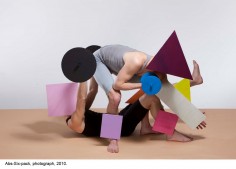KRISTINE HYMØLLER
source: kristinehymoller
According to Kristine Hymøller: ” My work has over gradually through the years shifted from making drawings, and sculptural works to a practice in which different disciplines are involved, exploring across the media of drawing, drawing, painting, print, photography, performance and sculpture.
When I work I’m constantly in dual. I relate my private life to my public life. I relate my escapist daydreams to the reality around me. The grasp of freedom and how it affects my identity and the way life moves, the complexity of living in a city shape and fitting in my escapist daydreams with the reality around me.
In my work I’m interrogating the social, emotional and physical aspects of corporeality and how different environments can affect the body. I examine the relationships between the body and the general form language in sculpture and architecture, in a global society where the relationship of the individual with regard to the larger social structures often are overlooked. I find relationships between tangible objects and I am looking at the relationship between form and matter. The difference between an actual form and the supposed archetypal form and how this form / environment influence us. The way we experience a particular form, is partly dependent on the environment in which the form is placed: the position of the form and our perspective on the form is variable.
In the recent years this way of working led to live performances, live performance photography and collages combining found footage. I work with these mediums broadly related to my research on what I call the ‘city-shape’. I believe that objects and the environments physicality not only affect how we move in this environment but also affects our state of being. In these works I explore how simple shapes create memories and affect us on a social and cultural level.
Performances are realized in studio setting or as live performances in connection to an event: The performers have basic geometrical shapes attached to their bodies which affects the movement and shape of the body. Together they become some kind of Bodily dance machine: the shapes regulate the body, forcing it to make certain movements and It is not really clear if it is the body or the shapes attached to the body who is in charge of the choreography.
By using objects as an extension of the body, I literally want to influence the environment and our mental state. In the performances I’m using a slightly ironic tone to represent a stereotypical ideal body image, to the point that it almost appear as an iconic image.
Photographs and collages belong to series of staged photographs and mixed imagery in urban settings. It is my attention to build an archive, containing a collection of sculptural portrays of the urban landscape, investigating the fine nuances that appear in the process interfering with the coherency of a cityscape. In these works I dissect urban architecture into its constituent formal elements. Sometimes I manipulate the photos to emphasize formal shapes and elements. Sometimes I place performers in an urban setting and I resonate their physical presence by means of geometric shapes pasted to their body. By partly covering the image, architecture, people, with shapes I interrupt the actual story and the structure on the image. This creates a sudden change in the perspective, the dimension, the relation between the building and the people covered by the shapes and it makes it difficult to read the image as one coherent representation. The viewer is continuously switching between the architectural image or the resonating abstract play of geometrical forms and shapes”.
.
.
.
.
.
.
.
source: puppetmasterproject
Kristine Hymøller wurde 1972 in Kopenhagen geboren. Sie lebt seit 1997 in Amsterdam, wo sie an der Rietveld Akademie und am Sandberg Institut studierte. Hymøller zeigt ihre Arbeiten in und außerhalb der Niederlande, erhielt mehrere Arbeitsstipendien des Niederländischen Funds for visual art (FKVB).
Sie arbeitet mit verschiedenen Medien – oft im Rahmen von bildhauerischen Konstruktionen. Kristine Hymøller setzt Figuren konsequent in den Zusammenhang des konstruierten Raums.


